#I highlighted all the main CANON aspects in those first three chapters so continuation of it would imply writing headcanon ideas either way
Text
The funny thing is that I remember how much I struggled with the title for the fourth chapter of "Was Born To Lead" (A New Beginning) and was never quite satisfied with it, but now, I realize it does make sense, considering I actually began to write a completely new story with this chapter.
#Was Born To Lead#I make way too many posts about this fic now it deserves its own tag#I mean originally 'Was Born To Lead' was supposed to be a drabble collection about Gabe's past#but the fourth chapter implied there was supposed to be a continuation so I wrote it#and then I wrote an absolutely random Ángel chapter and delved into Valerio's past....#I mean Valerio was supposed to be important in the orginal concept as well but having his own storyline.... no I didn't expect that#Honestly I'm still not quite sure if I went in the right direction developing my own characters and creating an ongoing storyline#basically having nothing to do with canon and maybe at some points not even looking realistic enough for Gabe's actual backstory#And I'm pretty sure my OCs are one of the reasons for many people not to read it because you know when you read fanfiction#you want to read about the characters you already know and love#And my OCs may be just not interesting enough for that#But I... like what I'm doing?#Honestly looking back I realize that I wouldn't be able to make it drabble collection because we freaking nothing know about Gabe's past#I highlighted all the main CANON aspects in those first three chapters so continuation of it would imply writing headcanon ideas either way#And I made Gabe the actual main character of his story being surrounded by his friends family and other characters#who have their own lives as well#He has his own adventures fitting his personality and attitude#I try to highlight different aspects of his character bringing up some small details like him loving Antonia Agama or being bad at riddles#and more major ones like his conflict with Roberto and his subtle leadership makings#I mean I understand reading about OCs may be a bit annoying especially if you don't like them but there's still enough Gabe#and of the points of this story was to make it multi-layered so if you don't like one thing you may like another#I don't I'm probably too narcissistic and biased towards this fic but I genuinely enjoy working on it#Maybe it would be interesting for more people if I made it as a drabble collection#But I'm glad how it turned out eventually#There's supposed to be 'I know I'm probably' I'm just too lazy to fix it
3 notes
·
View notes
Note
how did you get into writing fic? i'd love to start but idk even where to begin! I loved adats so I was wondering do you have any advice?
Oh my goodness! I am so flattered you’ve asked me this. Yes, I can absolutely help. I’ll throw a bunch of rambling under the cut.
I started writing fic probably when I was... sixteen years old? A lot of my early works were oneshots. I couldn’t figure out how to do anything plot heavy for the life of me, so I just stuck to AUs or whatever I felt like. I wasn’t in any particular fandom -- I really wrote whatever I had ideas for. I remember I tried once to do a plot-heavy story and I received a review absolutely ripping it to shreds. Like, it was so cruel I cried lol. I ended up deleting the fic. Years later, I get what they were trying to say (basically, more substance, less style), but at the time it cut to the quick. Really, it was only when I was in my twenties that I started writing work that was longer and/or better.
The fandom that helped me actually write plot heavy work was a historical-based fandom. As I’m a historian, it was perfect. I got to use my research skills and knowledge to create works that, above all, aimed to feel authentic. I mainly read historical fiction, so I was familiar with how that genre worked. Miraculously, people loved my work. I think I wrote about ~200k in the period of a year? These were several short stories (20-40k) and a few oneshot filler fics. While I was part of this fandom I also helped organise a Big Bang which was a lot of hard work but was extremely rewarding. Along with that, I interacted mainly with other fic writers, so I spent a lot of time chatting to people about ideas and encouraging other writers, and it just created a lovely medley where no concept was impossible or any line of dialogue too difficult. We supported each other and it was truly like a little commune. I gradually stepped away from the fandom mainly because it was just a part of my life at a very specific time, and almost as soon as that time was over, my love for that story/ship faded, but I firmly believe I figured out a lot of how/what I do now purely through that experience.
Regarding ADATS
With ADATS, it stemmed entirely from wanting to “explain” three months in canon (at the end of season three). I was interested in the idea of season four setting up Will/Mike in canon, and I wanted to test the source material to see if I could draw from what already existed to create something authentic. I began with that simple idea: what happened from July to October in 1985? Then I thought about the major themes I wanted to hit -- family, friendship, coming of age, sexuality -- and I nested them around the bigger concept: how do I get Mike from being ostensibly straight to realising he is gay? That meant thinking of two steps: Mike discovering his attraction to guys; Mike discovering his attraction to Will. Those two concepts were separate “arcs” that needed addressing in different ways. Balance was key to weaving them together and making the reader feel like they knew what was coming (and that they felt smart for putting the pieces together) without just rushing through and going “now kiss!” That’s partly why ADATS needs a sequel, lol: because it’s not finished!
Writing process
The first thing I do when I start to get an idea is I write it down. Sounds obvious. But when you have a killer line of dialogue come to you in the shower and you think “I’ll remember that” -- reader, you will not remember it. You gotta get it down ASAP! I do that the whole way through, as generally I’ll be thinking of scenes I’m stuck on and then it’ll just come to me and I’ll quickly jot it down.
The next thing -- or what I do in the meantime -- is start structuring. I plan. I try to plan a lot. Sometimes it’s okay to write “and something happens here to get them here”, because you’ll figure it out later, but for the most part I’ve discovered that planning is like gold and you can’t get enough of it. I break my work up into generally 3-4 parts/sections, and I treat each section like a mini story. So each part needs a conflict and resolution, and it needs to flow into the next section. You need to have a feeling of things evolving and maturing. Once I’ve planned those little bits, I start thinking about the bigger plot arc and how I can drop in hints along the way. I’m probably not a subtle or skilled enough writer to yet pull off that sort of gasping twist you get in really excellent books, but I’m trying to get there. It’s hard, is what I’m trying to say, but that’s okay, because we’re all learning.
Then I generally do aesthetic stuff. Sounds stupid, probably. But nothing helps me get more into a mood than doing a Pinterest board or -- most of all -- making a Spotify mix. I start thinking about the vibe and the general atmosphere, and then I almost exclusively listen to that mix when I’m working. Sort of like muscle memory? Just to get the creative juices associated with that particular selection of songs.
Another thing I’ll do along with plot structure is character structure. This is a biggie. I mean, a story is nothing without characters. So I’ll just jot down a bunch of bullet points of characters and particular aspects that I want to highlight or remember. I hate continuity errors in fiction. Like, if someone says they work on Maple Street but later in the fic they’re working on Pine Street. I hate that. So I keep note of specific things that my main character might notice at repeated points in the story (colours, places, smells, names, sounds -- so they’re all consistent even as the narrative evolves). That’s another thing -- your characters’ motivations. Not everyone is going to be a huge player, but they all do serve a purpose. The most important character is obviously your main character. I personally think it’s important to let your M.C. be an arse at times. They’re going to be mean, they’re going to misinterpret things or fly off the handle... just let ‘em. Let them be wretched humans, and then bring them back and make them realise what they’ve done. Let them learn! I love consequences in fiction, lol.
At the same time, I’ll probably start writing. We’ve already written down some snippets of neat dialogue or descriptions, but now we should start the actual process. For me, I used to start at the beginning. Usually this was the most fleshed out anyway: I’ll have a clear idea of the beginning and the end, but nothing in the middle. These days, if I have a scene in mind that I can’t forget, I’ll just write it. It will possibly get scrapped or rewritten, but that’s okay, because at least you’ve got it down and now you can devote your brain power to something useful (like figuring out what the middle is supposed to be). I’ll have half a dozen of totally out of context scenes just littered in my Word document that I’ll add to as I go along. Eventually, though, you’re going to start writing properly, and that’s when you write your opening scene.
Opening scenes: super important. Every time I write a scene I think: what is the point of this? What do I want the reader to learn or takeaway? Sometimes you do have filler scenes, but they also serve a different purpose (perhaps to establish a group dynamic or to explore/describe a character’s surroundings). Mainly, though, every scene should push something forward in some way, whether it’s character development or a plot point. So, with an opening scene, I always think you have to establish: where you are; who you are; what they are doing; where they’ve come from (in a philosophical and practical sense); and where they’re going (ditto). That doesn’t have to happen in the first paragraph -- that would be silly. But if you sprinkle that information in over time it’ll gradually build up a picture of your character and that way the reader can get an idea of who they are. You basically need to give a snapshot of what your story is about. This also goes back to the character creator stuff: where they are at the start should be different to where they end up. How that happens is, of course, because of plot, and because you’ve structured everything to the nth degree, we’ve got a very clear progression of that character’s growth (/s easier said than done lol).
General advice
Write down everything: every idea, a bit of dialogue, a description, whatever. Write it down. Doesn’t have to be neat. Just has to be on paper. You can’t remember everything, so if you’re spending time trying to hold those things in your head, it’s taking up space for new ideas to come along.
Structure, plan, structure, plan. Sometimes it’s boring and I hate it. Other times, when I’ve not written in a few days and I open the Word doc and think wtf is this supposed to be, I am very grateful for Past Me for leaving such detailed notes. Seriously, it helps so much. Oneshots don’t really need planning, in my experience. You just get those out there. But multi-chaptered stories really do, even ones that “just” focus on a relationship.
Whatever you want to write, commit to it. Space goblins invade Hawkins? Do it. Eleven and Max find themselves in a cult akin to Midsommar (2019) and must escape? Yes. Just... whatever you want to do, remember that you’re writing it for you. Write what most interests you, what makes you when you reread it go AHHHHH I LOVE THIS!! Because that makes it a thousand times easier to actually get on with the writing when you enjoy what you’re doing.
Write a lot. Every day, if you can, or at least at designated times. Occasionally I have a very specific headspace/vibe I have to be in, but sometimes it just hits me and I’ll say to my partner “I need to write now” and just disappear, lol. The more you write the more you write. It’s so, so, so true. Cannot emphasise this enough. When I wrote that ~200k in twelve months? It was because I literally wrote every. day. Or near enough. Remember that some days you’ll write 200 words, and other days you’ll write 20k (this happened to me with ADATS -- part of the reason I finished it so quickly was because I had sprints of writing 10k+ at a time that only happened because I was in the rhythm of it). Write, write, write. Who cares if it’s crap! No one will see it until you are ready. In the meantime, just write!
Probably last of all (although I could go on and on) is connect with other writers. If you’re struggling to start, sometimes just talking about it can help a huge amount. I hope it goes without saying that you can message me whenever you want, anon or not, and I will talk to you. We can talk about ideas or I can beta stuff, whatever you want! Find like-minded people and talk to them about what you want to do. Another thing this helps is in advertising your work when you do publish. I see a lot of first time fic writers get super down because they publish their magnum opus on AO3 but no one comments. Honestly, it’s because no one knows you’ve published! You don’t have to be tooting your own horn every which way, but just actively talking about your work and even collaborating with other content creators with get you hyped and other people too (and the input and encouragement other fandom members give is just... out of this world. Anon messages helped me finish ADATS when I was really worried I wouldn’t [that’s the truth]. Seriously, support is everything). When you have people excited about your work, you get excited. It’s really as simple as that.
I could go on but this is already horrendously long. I hope even a bit of this helps! If you want to chat or have any more questions, just hit me up any time.
#writing tips#writing help#writing advice#answered#i really hope this helps/answers your question!#i can do something more structured if you want#otherwise here are just my initial thoughts#Anonymous
61 notes
·
View notes
Text
(This is a relatively long post, so here’s what it is: It’s a love letter to Haikyuu!!, the TL;DR is literally: I love Haikyuu!!)
I love this story a whole lot. I never expected to love it as much as I do now. It’s tied for my favorite all-time anime with my two other favorites (there is no picking the ultimate because these three stories and genres are too different to find a definite one that outdoes the other; all three fill certain needs I have in an anime).
But this one was... unexpected. You see, my other two favorite anime are One Piece and Sailor Moon, both anime that have been with me since the 90s, anime that I grew up with.
Haikyuu!! is different, because I got into it during season 1. Back in 2014. It’s... It’s a baby anime - in that it is still so young, compared to the other two. The same can be said about the genres; both magical girl and adventure/fantasy were basically the two types of anime I’ve been enjoying since the 90s.
2014 was the year I first got into the sports anime genre. In fact, Haikyuu!! was the second ever sports anime I watched (my first being Kuroko no Basuke). I never really took that genre seriously or cared to even check it out, because well... sports. Sports aren’t my thing, so what could possibly be the appeal of watching an anime about them...? But a friend of mine was very deep into KnB and after one convention where she cosplayed Kuroko, I figured I’d give it a shot and I really ended up loving it. And yes, I admit, the main thing that made me pick HQ!! next was Hinata’s hair; the bright orange really jumped out at me when helplessly browsing for a successor.
I watched the whole thing - well, there wasn’t much of it at the time, only the first season - and I literally immediately watched the whole thing again. I started my rewatch the same day that I finished my first watch. I’ve never done that before.
And after I finished the first rewatch, I started reading the manga. I don’t... do that. I do own two shelves filled with manga, so yes I read them, some of them are in fact corresponding to anime I enjoy, but usually when I watch an anime I don’t feel the need to also read the manga. (I don’t like reading much.)
In this case, I just needed to know. I needed to know how it continued, I needed more. The only anime that ever happened with is One Piece. And, much like with One Piece, I am horribly bad at actually keeping up. After a couple of weeks of being caught up and waiting for weekly releases, I drop the manga again so it can... gather more chapters for me to read. And usually I forget about picking it up again, tbh.
I rewatched the first season once more when the second season hit. And rewatched both seasons before the third, shortly after the second season had ended. And, after the third one ended, another obligatory rewatch of it all.
We’re in 2016 now, at which point I was pretty deep into sports anime and had started watching multiple ones with multiple sports and was so busy discovering new news that, admittedly, in the following years there was no rewatch. I was falling down rabbit hole after rabbit hole of new anime and the appeal of the shiny new beat out watching something for what would be the sixth time.
Only when 2020 hit with that fourth season did it happen again. At first, I only really wanted to watch that last episode of season 3, because well the release had hit me a bit out of left field and actually I’m kind of busy and there are so many things I’m already watching and supposed to do I can’t possibly watch 75 episodes of something I already know by heart. But mh, that final episode, how can I leave it at that? At the very least that final match, right? That third season. It’s only 10 episodes. I’ll just... skim through it, skip around it and watch the highlights - and oops, I forgot to skip anything. Well, now that only made me want more. I could maybe just--
Yeah, I watched the whole 75 episodes in a week. Which, admittedly doesn’t sound like much considering they’re only 20 minute episodes, I mean come on that’s ony 25 hours of TV. However it’s subtitles so it’s something that requires my whole entire attention and that’s not how I consume other media; I always write while watching TV. Anime is special, because no dubs for me. So it requires more time, in a way. And I usally only carve out time for maybe an episode or two a day when I watch an anime. With HQ!! it was that I accidentally kind of binged season 3 in a day like I didn’t mean to watch 10 episodes in a row but how do you stop? And it continued much the same (logically, if you look at 75 episodes over 7 days. That’s literally just math).
I had finished the rewatch and was left with the weekly wait and it is slowly killing me. My fingers are itching to just rewatch the whole thing again but I now have this girlfriend and like she’s super adorable and also loves anime and she made this whole list of recommendations so I’m kinda working through that and come on you can’t just watch one thing on a loop that’s ridiculous.
So I picked up the manga again, two weeks ago. I had left it off and bookmarked it on chapter 161. I’m currently on 311. That’s... 150 chapters in two weeks. That’s a lot for me.
That’s all a very long way of trying to express just how much I love Haikyuu!!, because I just... genuinely can’t stop? I’m so thoroughly enjoying this whole thing that I just wanna consume it again as soon as I’m done because it’s so good.
I love the character, I adore the characters. Hinata Shouyou is in my top five favorite male characters of all time. I love him so much. But not just him. Not even just his team, aka the main characters? This one just completely makes me love even the other teams - yes, naturally the main rivals the most because that is by design, but usually sports anime fall short on making me invest in anyone beyond the actual main team, it is very rare that the main rivals get some baseline investment from me. Usually I’m just in it for the main characters, why should I care about those... stepping stones? The teams they defeat on the way.
Haikyuu!! has me squeal and point stupidly when my big dumb owl shows his face (Bokuto ily). It has me excited for them all. Invested to a certain degree (naturally, I don’t want the other teams to win when fighting Karasuno, because duh).
I even love the female characters in it! I very rarely can even stand female anime characters because like... 90s American stereotype female characters be cringey but anime stereotype female characters are the bane of my existence. Here, I love them, I find them wholesome. They’re not being exploited like in certain other male-centric franchises where they need the biggest tits possible and the thinnest waists imaginable and only exist for the male gaze and for the male characters to be perverts about them.
Hinata isn’t some super gifted chosen one but he has to work hard, really hard. They all do. And they all get their growth and just the pure excitement whenever they do learn something new, whenever they do improve? Not to mention his character design, that short ball of sunshine and fluff. His hair kills me. Seriously, that orange fluffiness. He’s so smol but so energetic and so bright in that contageous anime protagonist way - meaning that he just makes everyone around him like him and cheer for him and smile with him (well, not everyone *side-eyes Tsukki*).
Tsukishima has such a great arch. He starts out as such a stereotypical bully who is just put into the way of the protagonist to create some tension, but then he actually gets fleshed out fully, gets his own arch and growth and I genuinely never expected to care about the damn bastard??
The humor in this one also kills me. So much dry-witted sarcasm and snark, so much of the humor lays in the facial expressions of the characters too! It’s a joy to watch and to read.
The pacing just works. There are some sports anime that rush too much through games and some that drag them out too long - but in boring ways. This anime turned one volleyball game into a 10 episode season and manages to convey so much tension and excitement that even after I had already seen it twice and absolutely knew the outcome, I still couldn’t even pause and had to watch the whole thing because I needed to see how it continues.
They manage to convey all this excitement and also the joy - the joy of the characters whenever a play works out - and the surprise when something new happens in ways that have me excited all over again, even when I really shouldn’t be because I already know exactly what happens.
And then there’s the animal theme. I love a good animal theme. The fact that basically all the teams have an animal associated with them. There are such great visuals given with the animal themes too.
Naturally, there is also always the component of shipping for me. Such great ships that I love so dearly and... honestly, nothing has ever made me ship an OT6 before because I’m over here, juggling all these overlapping ships and loving and cherishing them all.
I don’t know, on the greater scale of things and the vast, endless landscape of anime, this may just be one of many, but to me personally...? It is... It’s like this one was just perfectly tailored to me, specifically, in a manner I experience very rarely. TV shows are always about compromises. Sure, I like plotlines A and C and D but man do I hate B and yeah I love the main character but urgh X member of the main cast I just loathe and then there’s the unnecessarily forced canon romance that’s making me cringe - these kind of things.
With Haikyuu!! I just... enjoy everything. Every aspect of it. Every character of it. Every interaction between characters. The writing, the art-style, the animation, the pacing, the characters, the plotline, the execusion. I just love the whole damn thing.
6 notes
·
View notes
Text
Chapter 218 is Amazing and Here’s Why (Continued)
So I had intended to finish my analysis of chapter 218 of One Piece in one post, but things were starting to run a little long and I split it in two. Here’s Part 1 for those who are interested. For the rest of you, let’s jump in where we left off
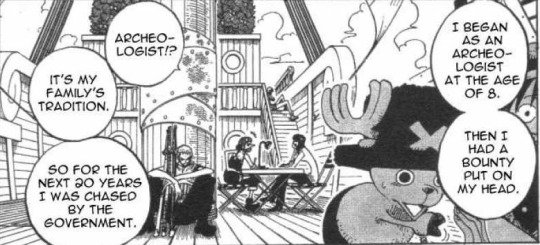
I know I say this a lot, but I really like that panel. For one thing, Usopp is using a desk lamp. Knowing him, he probably invented it himself just for the occasion.
On a more serious note, the entire feel of this scene is completely different than the last time the Straw Hats as a group interacted with Robin. I wrote extensively on chapter 114 here, but what I want to draw attention to now is how the tables have (supposedly) turned. Remember how Robin held all the power and was seated above the Straw Hats while tossing them around like a bunch of punks?
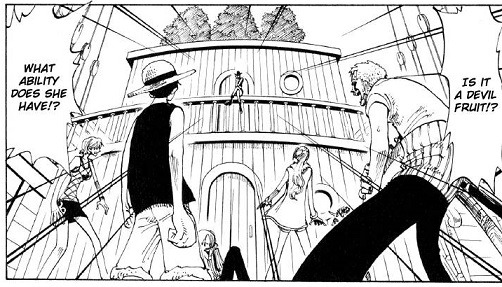
Yeah, that’s no longer the case. Robin is surrounded by Usopp, Zoro, and Nami, the three Straw Hats who distrust her most. And while Usopp’s too much of a chicken to be intimidating, there’s no mistaking Zoro and Nami’s body language. They’re closed off, guarded, and Zoro at least has his weapons close at hand.
At the same time, the way the speech bubbles are placed draw attention to Chopper and Luffy. You can barely make out a hand, and one might assume it’s Sanji’s, as he’s the only Straw Hat not visible.
Which, of course, it’s not
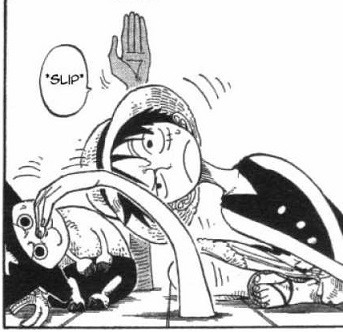
This set up is the impetuous for three hilarious pages where Robin one by one wins over the Straw Hats (except Zoro, because he’s a killjoy). I recommend reading the entire sequence to get the full effect. It’s classic Oda humor from start to finish that makes me smile every time I read it
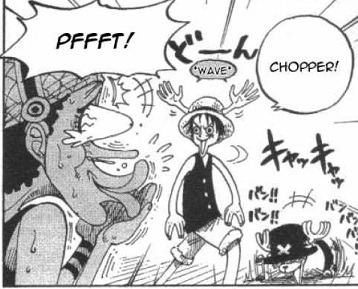
(especially this)
Now going back a bit, Robin tells Usopp that she’s an archaeologist from a long line of archaeologists and has been on the run for twenty years. Never once in this entire “interview” does she lie. In fact, I can’t recall Robin ever lying in the entire series, except for when she didn’t give Crocodile Pluton’s location.
There are a couple of different reasons for this. For one, it’s convenient for the narrative if the audience doesn’t have to second-guess everything the main characters say. On the whole the Straw Hats are pretty honest people - Usopp being the obvious exception. (Nami is also a bit of a wheeler and a dealer, but since Arlong Park is more prone to using her good looks and force of will to get her way over straight-up lying. That, or stealing what she wants outright.)
Secondly, Robin has had a bounty on her head for a long time. The Ohara incident was publicized around the world. There’s no reason to hide certain aspects of her backstory when it’s essentially public knowledge.
Still, it’s interesting to note that the one Straw Hat who is known world-wide as a demon who has betrayed every group she’s joined tells the truth here. It’s obvious that in addition to winning the Straw Hats over, Robin is using her ability to direct the attention away from herself. One might even suggest that Robin tells Usopp she’s an assassin to rattle him enough to avoid more personal questions. She does a masterful job of using each of the Straw Hat’s weaknesses against them.
It becomes more apparent later on that Robin is an incredibly private person. When Chopper and Sanji are looking for her on Water 7 they don’t know where to even to start, because there are no ancient ruins about, and that’s the only place they can think of where she would go.
Now, this falls more into the realm of theories and head canons, but since Robin’s whole dream focuses around finding The Truth and since her whole life has been ruined by vicious slander and falsehoods, I would imagine that Robin hates lying more than the average person. She will misdirect, avoid questions, or tell bits and pieces of well-known information without giving context, but she won’t lie.
Moving on, Robin uses the same intelligence and playful nature that was established in chapter 114 to avoid any more of Usopp’s questions (consistent characterization, gotta love it) before having a private word with Zoro. I like how Robin doesn’t even try the same tricks she used with the rest, because I think she knows it won’t work. Instead she addresses him more or less as an equal.
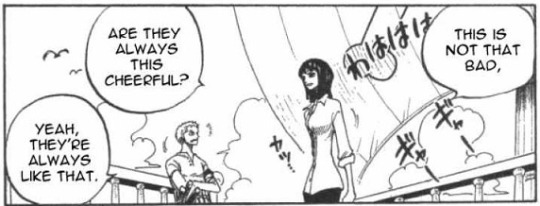
Assuming this is a nuanced and accurate translation, when Robin says “This isn’t that bad” we can make the assumption that she thought it would be bad. It’s understandable that she would think this way - the Straw Hats were her enemies not too long ago - but it brings up the point that Robin willingly stowed away on a ship she knew she wouldn’t be welcome because she had no place else to go. When Zoro affirms that the Straw Hats are basically a bunch of dorks, Robin smiles.
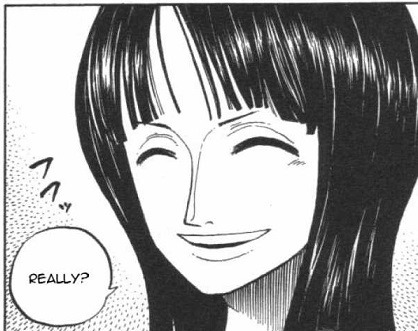
Now Robin smiles an awful lot for someone who wants to die. It’s basically her default expression, and it’s nothing but a front to hide her real feelings. She even smiles when she’s just been stabbed and is about to be buried alive after living a miserable, meaningless life without accomplishing anything she’s ever set out to do. That’s one deeply-rooted defense mechanism.
This is the first time we see Robin really be happy, and her surprise at learning that the Straw Hat Pirates are fun-loving and cheerful even when traveling with a former enemy is the kick-start to Robin’s character arc.
Because make no mistake, the Robin who joined the Straw Hat Pirates was the same Robin who joined Crocodile. All the stuff at the beginning of the chapter helps flesh her out into a fully-realized character instead of a cardboard Vivi replacement, but at this moment Robin’s beliefs about the Straw Hat Pirates are challenged, and a character can’t change if they aren’t challenged.
There’s a cute Zoro-pouty face to that ends this scene, and our focus swings back to the Straw Hats as a whole. An undetermined amount of time has passed because now they’re talking about the weather and Zoro is back to lifting weights
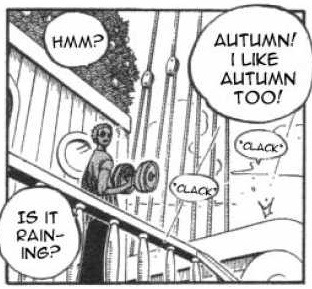
I don’t know if you can have foreshadowing that’s paid off in one panel, but Oda doesn’t waste a beat with the little clacks of wood against wood. For the second chapter in a row there’s an amazing twist at the end that no one could have seen coming. I already shown this spread in my last post, but it’s so epic it deserves a second viewing
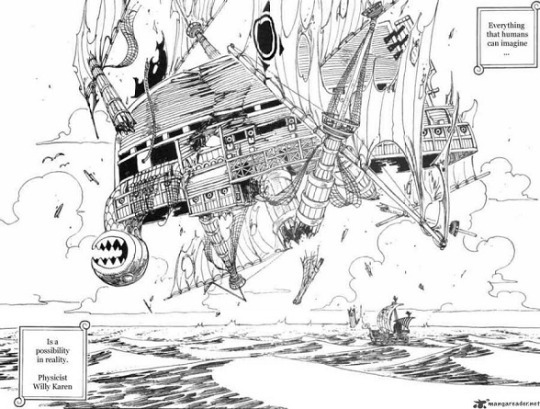
I can’t remember if this is the only time Oda has used a real life quote in One Piece, but if not, it’s one of very few. And honestly, what could be more appropriate for a series like One Piece? The whole composition of this page is beautiful, and all the little details take my breath away. I really don’t get it when people say Oda’s art is ugly, because they’re wrong.
Anyway, things get crazy for a couple of pages while the Straw Hats try not to capsize. Oda has this thing he does when he uses square or rectangular panels for his dialogue and uneven shapes like trapezoids for action scenes. I think that’s pretty standard procedure for comics (I’m by no means an expert) but here Oda helps sell the chaos by composing his pages so it feels like the panels are tilting with the ship
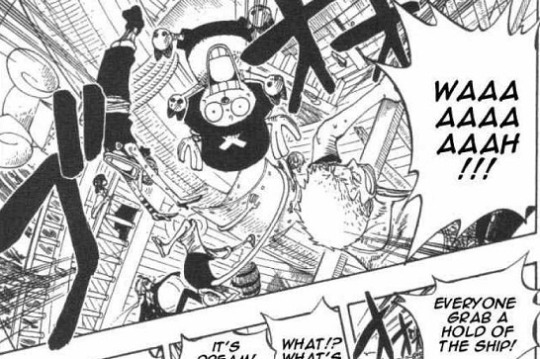
There’s also a nice gag with Usopp that doubles as a character moment. Instead of grabbing hold for dear life Usopp sits and closes his eyes to pray, completely ignoring the problem in hopes that it goes away. It’s funny here when he gets a skeleton to the face, but it highlights a huge flaw that finally comes to a head during the Water 7/Enies Lobby arcs.
After that we get this sequence of panels

Please forgive my horrendous edit, but I wanted to show how the speech bubble fits into curve of the wave in the second panel and leads the eye through the rest of the sequence even though the individual images don’t really relate to one another. Oda constructs this scene in such a way that we feel the chaos, but he does so in an orderly fashion. Each panel gets smaller and smaller - similar to the “fade to black” technique I talked about previously, and it leads directly the last splash panel on the page
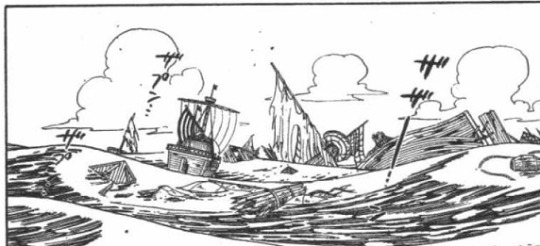
The chaos ends just as abruptly as it began. The Straw Hats are mystified, and, honestly, Oda could have ended the chapter here. It’s such a high note, a good dose of Grand Line craziness after so much focus on the crew. But Oda isn’t satisfied with stopping here. He ends the chapter with what I believe to be one of the best story hooks in the series, tied only with Zou for sheer “WTF, the Straw Hats are going where?” moments in all of One Piece.
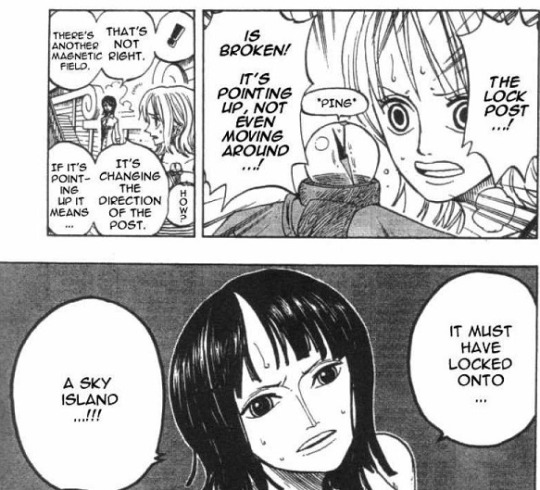
Skypea isn’t my favorite arc in the series. A lot of people say the same. But if you can pretend that you’d never read/seen what was coming next and take the end of 218 for what it is - and that’s pure hype - then you’ve got to admit that Oda has done his job.
So that concludes our look into chapter 218 “The Log Pose and Why It Is Round”. To summarize my thoughts on the chapter and why it’s amazing
Ships fall from the sky
Oda never forgets
But he does lure us into thinking he does
Ships fall from the sky
Robin is established as a “protagonist” without necessarily being a “good guy”
Symbolism
Excellent page composition
Gags that reveal character
Consistent characterization with hints of further development to come
and last but not least
10. Ships falling from the sky
(Thanks to everyone who has the patience to read this far. Next I’ll continue my Nico Robin study with chapter 253, specifically looking at Robin’s place in the Skypea arc and how Oda prefers stealth development over big character moments. See you next time!)
#One Piece#Eiichiro Oda#Analysis#Nico Robin#Straw Hat Pirates#Writing#Manga#Character Study#creative-type analyzes
87 notes
·
View notes
Text
Discuss the Function of the Narrators in Jane Eyre and The Remains of the Day
The perennial Jane Eyre, and Booker Prize winner, The Remains of the Day are two highly acclaimed novels in English literature. Their importance is shown by their place in the canonical literature of modern English education. In both of these stories there are many similar elements that the main characters go through which are familiar to most adult readers, such as love, loss and trials of the main character. One form of trial that characters in both books often face is duty, and this can be seen in some very poignant moments. Jane Eyre is often seen as a semi-autobiography of Charlotte Brontë’s life, and the element of duty may well be based on her experience as a teacher (Cody, 1987). A similar, if weaker, connection can be found between Kazuo Ishiguro’s work prior to writing (ranging from community work to shooting grouse for the Queen Mother) (Bown, 2011), and The Remains of the Day’s main character, Stevens. This essay details examples of how the main character shows duty; one from Jane Eyre, followed by one from The Remains of the Day. After these, the two examples will be compared in order to discuss the function of the narrators, who are the main characters in both books.
One of the strongest, yet easily missed examples of duty in Jane Eyre is halfway through chapter seventeen, when Rochester orders Jane to join in the parties held for the visiting aristocrats, including the person Jane sees as the barrier between herself and Rochester; Blanche Ingram. The initial order itself is not delivered directly by Rochester, but delivered through Mrs Fairfax, who is told the order after she ‘happened to remark to Mr Rochester how much Adèle wished to be introduced to the ladies’ (Brontë, 1999, p.148). Initially Jane thinks the purpose of this is to have someone there with Adèle, and remarks that she does not need, nor want to attend. Expecting this, Rochester explicitly tells Mrs Fairfax that Jane should be there. At this point, Jane still sees it as part of her job of looking after Adèle, so she never questions why she should be there, despite the awkwardness of the situation, and the utter disdain Blanche shows towards her. Her desire not to be around the alien group of people whom she knows will treat her differently causes her to choose to sit away from them, however, her duty to Adéle motivates her to be there. Jane’s illustrates here that duty must be carried out in order to maintain self-respect, or dignity, despite the rigid and belittling social order in which she exists. The effect of Jane Eyre being a kind of autobiography gives the impression that Brontë placed greater esteem in self-respect than on taking notice of social structure and conventions.
This example continues through the rest of chapter seventeen, highlighting other aspects of duty. The Ingrams, including Blanche, spoke viciously of their experience of governesses with Rochester and the party; no doubt with the hope of inflicting harm on Jane’s reputation. Jane, as the narrator of the book, and also as Brontë’s semi-autobiographical self, never mentions a word in response to this. This is probably because overall the Ingrams’ role is quite small, and so their views do not warrant Jane’s retrospective attention. However, the alternative argument is that their views do not warrant her attention because her duty does not allow her to be concerned with what they think, and her sole concern is to deliver a professional service to Rochester. This argument might also suggest that as well as social structure, Brontë placed less value in what upper classes might think than the rest of society.
The chapter ends with Jane sneaking away while the party has their attention occupied, only to have Rochester follow her out, and ask her to re-enter. The ensuing conversation sees Rochester trying to ascertain why Jane has left without addressing him, how she has been, and why she seems depressed. Though Jane is, to the reader, clearly upset about Rochester and his apparent love interest, when she is asked why she did not speak to him, she narrates 'I thought I might have retorted the question on him who put it: but I would not take that freedom’ (Brontë, 1999, p158). In this, Jane shows that her duty has overridden her passionate disposition with a professional manner suited to the environment in which she works. Jane’s adaptable nature is important throughout the story, and is quite probably Brontë’s own commentary of how people had to be adaptable if they were to survive in the harsh society of early nineteenth century England. Incidentally, during this section of the novel, Jane does not give much indication of her own feelings. It is only from Rochester’s remark that she seems depressed, and then that she is crying that the reader knows what her feelings are.
Whether Jane Eyre is to be seen as a semi-autobiography of Charlotte Brontë, or not; the attitudes to society held by the first person narrator and protagonist, who addresses the reader in second person, thereby gaining their attention; are a direct representation of the author’s own. If this is considered, then it can be seen that Brontë herself regards duty highly. However, it also shows her other attitudes regarding social structure and conventions, particularly that wealthy families can show very little respect to everybody outside their own class.
This next example of duty is found in The Remains of the Day, and makes a good parallel for the example found Jane Eyre. However, before comparing the two, it is best to detail and analyse this particular section. It begins with Stevens’ employer Lord Darlington calling him into the drawing room after midnight. When Stevens arrives he finds that he is subjected to a variety of detailed questions relating to international politics. Stevens quickly sees his duty in the situation and shows this in his narration, which is reflective, by saying to the reader 'I was naturally a little surprised by this, but then quickly saw the situation for what it was; that is to say, it was clearly expected that I be baffled by the question’ (Ishiguro, 2005, p205). He then proceeds to answer that he is 'unable to be of assistance in this matter’ (Ishiguro, 2005, p205-206) to all three questions asked of him. The effect of this was to prove that, as a man outside politics, Stevens is an example of why the general populace should not have a say on what the leaders of the country do. However, the effect it has on Stevens is the only one which gives the reader reason for concern, not least because the story outside of him is based on historic events which still allowed democracy to continue, but really because Stevens is the one who addresses the reader, and takes them through the events of his life. The fact here is that those without duty would have an opinion on any matter on which they had knowledge, and as Stevens lived and worked for many of the world’s politicians at the time, he would undoubtedly have had knowledge, and therefore an opinion on the matter. The way the conversation goes is embarrassing for him, but all that Stevens sees is what he must do to fulfil his duty. As far as Stevens is concerned, forfeiting his own reputation and self-respect, was the very same action that gave him a sense of dignity. The opposite view of this is held by Jane in Jane Eyre, who would state that self-respect and dignity were the same thing.
The author, Ishiguro, seems to make a point that people have a duty to live their own lives, away from servitude, throughout this book. Stevens is the archetype of a professionally dutiful person, but far more than that, Stevens takes his duty to the extreme that he acts blindly, and pretends ignorance to all outside of it. The only time Stevens seems to give a view follows this event, when Lord Darlington comes to apologise to him the next morning and explain the previous night’s occurrence. Lord Darlington goes on to talk about the current state of affairs and asks for Stevens’ view, to which he replies 'The nation does seem to be in a regrettable condition, sir.’ (Ishiguro, 2005, p208). It is not clear whether this is Steven’s genuine view or not, but it is Lord Darlington’s view, and de+spite seeming like an opinion, is actually just Stevens acting out his duty once again. What Ishiguro illuminates here, intentionally or not, is that a line should be drawn between duty and opinion, otherwise there is a danger of following people blindly, who may be powerful and influential, but are no more correct than those following. Stevens’ function as the narrator is that he draws the reader into his perspective, which is the embodiment of duty, and it shows the reader, first hand, the previously mentioned dangers of going through life that way.
The similarities between the two examples shown here, are obvious to the reader. They both see the narrator thrown into socially awkward situations; both see the same character being belittled by a, supposedly, superior class of people; and in both the narrator simply remains subject to the embarrassment for the sake of fulfilling duty. However the two characters’ views on their respective incidents could not be portrayed much more differently, with Stevens taking it as an opportunity to prove his professionalism, almost to the point that he relishes the discomfort as a sign that he gives his all to his work. Meanwhile, Jane remains uncharacteristically silent about her feelings throughout her time at the party, and it is only from Rochester’s commentary that the reader sees she is upset. The function of the narrators in both these books seems to be to reflect of the author’s own views. This is much clearer in Brontë’s Jane Eyre, which is often seen as a semi-autobiography of the author, and is largely based on her own life. This is also there in Ishiguro’s The Remains of the Day somewhat, in that the author has experience working in a variety of jobs across different social classes before finding his preferred vocation as an author. The authors’ experiences show in the form of messages in their respective books. Jane Eyre shows that duty to an oppressive social system, is a part of life to which people must adapt if they are to survive in life, while The Remains of the Day uses Stevens as an example of what happens when professional duty is taken to the extreme, life is missed, and really people have a duty to live their own lives. The importance of both of these books in society is that they display these messages so well.
Word count: 1,804
References:
Bown, J. (2011) Kazuo Ishiguro, Available at URL: http://literature.britishcouncil.org/kazuo-ishiguro [accessed 13/5/14]
Brontë, C. (1999) Jane Eyre, Ware, Wordsworth Editions
Cody, D. (1987) Charlotte Brontë: A Brief Biography, Available at URL: http://www.victorianweb.org/authors/bronte/cbronte/brontbio.html [accessed 13/5/14]
Ishiguro, K. (2005) The Remains of the Day, London, Faber and Faber Limited
0 notes